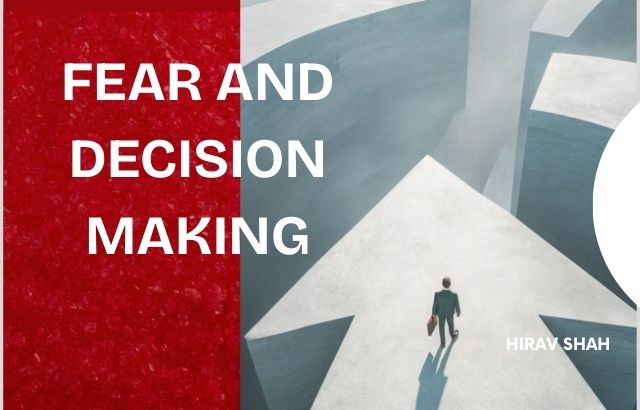Fear is a powerful emotion. It can paralyze us, cloud our judgment, and lead us down paths that we later regret. More often than not, fear pushes us into decisions that are rooted in the need for safety and certainty, rather than in pursuit of long-term success and growth. When we allow fear to take the lead in our decision-making, we miss opportunities for expansion and progress.
In this guide, we’ll explore the powerful influence fear has on decision-making, provide practical strategies to make confident choices, and share Hirav Shah’s insights on how to make decisions from a place of high energy—unlocking your true potential.
Table of Contents
The Power of Fear in Decision-Making
When we make decisions out of fear, it clouds our judgment and often leads to choices we regret later. For example, consider someone hesitant to apply for a promotion due to fear of failure or fear of being rejected. That person might settle for the status quo, avoiding the discomfort of taking a risk. However, by doing so, they miss the potential growth and rewards that come from pursuing a more challenging role.
Fear limits our possibilities. It keeps us stuck in our comfort zones, holding us back from personal and professional growth. Fear can also breed negativity in the workplace, affecting relationships, productivity, and overall morale.
When we make decisions rooted in fear, we are more likely to:
- Avoid taking on new, challenging projects
- Refuse to have difficult, yet necessary, conversations
- Stick to the safe, familiar route and avoid risks
As Hirav Shah, renowned business strategist, puts it: “In the moments of decision, your destiny is shaped. Don’t let fear dictate your choices—make them from a place of high energy and clarity.”
How to Make Effective Decisions from a Place of High Energy
Here are Hirav Shah’s strategies to ensure your decisions come from a place of strength, not fear:
1. Trust Your Instincts
Your intuition is your internal compass. When faced with a difficult decision, don’t ignore that gut feeling. If your instincts are telling you something feels right or wrong, pay attention to them.
Example: As a business strategist, Hirav Shah often advises clients to listen to their gut when expanding into new markets. A well-calculated risk can open up new avenues for growth, but ignoring your intuition might lead to missed opportunities.
2. Prioritize Key Factors
Making decisions is about evaluating many factors—data, impact, experience, and the cost of delay. A good strategist doesn’t just look at immediate outcomes but weighs long-term consequences.
Example: Let’s say you’re deciding whether to enter a new business venture. You need to prioritize timeliness, the financial commitment, the impact on brand equity, and how aggressively the market is growing. The role of a strategist is to balance these factors and make informed, actionable decisions.
3. Clarify Your Vision
Know where you want to go and align every decision with that end goal. A clear vision makes decision-making easier. When you’re aligned with your purpose, decisions become more straightforward.
Example: When Hirav Shah helped a tech startup pivot, he emphasized creating a roadmap aligned with the company’s long-term vision. Knowing exactly where they wanted to go helped them assess their options with clarity and confidence.
4. Be Okay With Stumbling
Making mistakes is part of the process. Fear of failure can paralyze you, but failure itself is often the best teacher. If you stumble, learn from it, adjust, and keep going.
Example: Many successful entrepreneurs have faced failures before reaching their breakthrough. Think of Steve Jobs or Jeff Bezos—both faced significant failures, yet those experiences were critical to their eventual success.
5. Keep Moving Forward
Decision-making requires action. Fear can make you hesitate, but sitting still won’t bring you closer to your goals. Action is key.
Example: In a fast-paced industry, if you hesitate to adopt new technologies because of fear of the unknown, you risk losing market share. Adaptation and swift action often lead to a more competitive edge.
Fear-Based Decision-Making: The Hidden Consequences
Fear-based decisions rarely lead to growth. Here are some of the most significant impacts:
1. Clouded Judgment
Fear triggers your body’s fight or flight response, which can result in snap judgments. These knee-jerk decisions can be reactive rather than proactive and often lead to regret.
Example: Imagine a manager who, out of fear of confrontation, avoids addressing poor performance in a team member. This could lead to unresolved issues that worsen over time.
2. Limited Possibilities
When fear dominates, you tend to play it safe. You avoid risks, which might prevent you from exploring exciting opportunities for innovation and growth.
Example: Fear of making mistakes might prevent a company from launching a bold, innovative product that could change the market.
3. Negativity
Fear-based decisions can spread negativity, affecting your environment, whether in the workplace or personal life. This negativity can stifle creativity and teamwork.
4. Personal Stagnation
Choosing comfort over challenge may seem safe, but it keeps you from evolving. Growth happens outside of your comfort zone.
5. Missed Opportunities
Fear can make you indecisive or overly cautious. This often leads to missed chances for career advancement or business expansion.
6. A Cycle of Regret
Fear-based decisions often lead to regret. Over time, you may look back and realize that fear held you back from pursuing what truly mattered.
7. Overcoming Fear = Empowerment
Choosing to face your fears with confidence unlocks empowerment. It builds resilience, allowing you to learn, adapt, and grow from every decision.
Key Strategies for Overcoming Fear and Making Confident Decisions
1. Identify the Fear
Take time to reflect on the specific fear affecting your decisions. Is it fear of rejection, failure, or uncertainty? Identifying the fear gives you the clarity to address it.
2. Challenge Your Assumptions
Fear often arises from irrational assumptions. Test whether your fear is based on facts or mere projections of worst-case scenarios. Reframe your thinking to build confidence.
3. Seek Support and Advice
Sometimes, discussing your fear with a mentor or trusted colleague can provide valuable perspective. Their support will help you make decisions with more confidence.
4. Evaluate Long-Term Consequences
Consider how your fear-based decision will affect your future. Will avoiding a challenge now prevent growth later on? Take a step back and look at the bigger picture.
5. Take Calculated Risks
Fear often holds us back from taking calculated risks. Evaluate the pros and cons of each choice, and consider the potential rewards that outweigh the risks.
FAQs: Overcoming Fear in Decision-Making
Q1: How do I know if I’m making decisions based on fear?
A1: If you find yourself overly cautious, indecisive, or avoiding challenges, you might be making fear-based decisions. Fear often manifests as hesitation or a desire to stay within your comfort zone.
Q2: Can fear ever be helpful in decision-making?
A2: Yes, fear can alert you to potential risks. However, it should not dominate your decision-making. A healthy balance of caution and courage is key.
Q3: How can I become more confident in my decision-making?
A3: Build confidence by practicing self-reflection, seeking advice, and making small decisions that challenge your comfort zone. The more you take action, the more confident you’ll become.
Q4: What if I make a decision and it turns out wrong?
A4: Mistakes are part of growth. Use them as learning experiences to adjust your approach and move forward with greater wisdom.
Conclusion: Empower Your Decisions, Empower Your Future
Fear-based decision-making leads to missed opportunities, stagnation, and regret. By adopting a mindset of courage and clarity, you can make decisions that empower you to grow and achieve your full potential.
As Hirav Shah says: “Fear can hold you back, but decisive action from a place of clarity, passion, and high energy will propel you toward success.”
The next time you face a challenging decision, choose to trust yourself, challenge your assumptions, and embrace the opportunities that lie ahead.
















